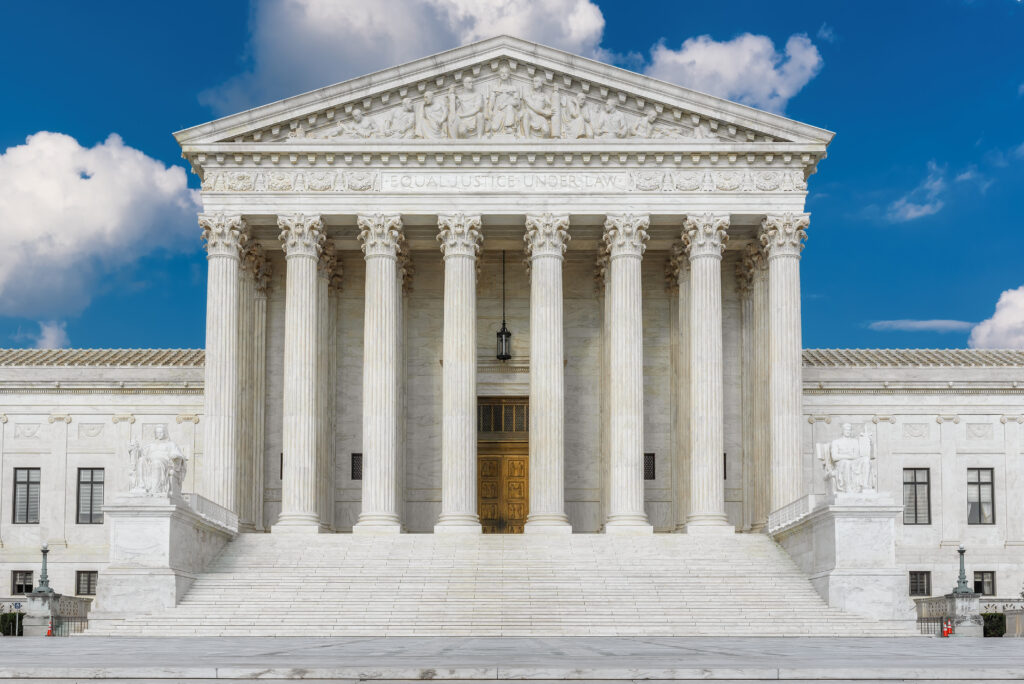Louisiana Voters Ask U.S. Supreme Court To Pause 5th Circuit Order Delaying Fair Maps
WASHINGTON, D.C. — On Friday, Sept. 29, voters in a lawsuit challenging Louisiana’s congressional map filed an emergency application in the U.S. Supreme Court asking the Court to pause yesterday’s ruling from the 5th U.S. Circuit Court of Appeals that would delay the implementation of a fair congressional map in Louisiana.

This case has been before the U.S. Supreme Court before, how did we end up here again?
The request stems from Ardoin v. Robinson, a case challenging Louisiana’s congressional map under Section 2 of the Voting Rights Act (VRA). The voters and civil rights organizations who brought the case against Louisiana’s congressional map argue that Black voters can only elect their candidate of choice in one of the state’s six congressional districts even though Black residents of Louisiana compose 33% of the total population and vote cohesively as a bloc. The lawsuit alleges that by failing to include a second minority-opportunity district, the map dilutes the voting strength of Black voters in violation of Section 2 of the VRA.
In June 2022, a federal district court blocked Louisiana’s map for likely diluting the voting strength of Black Louisianans in violation of Section 2 of the VRA and ordered the state to adopt a new map with a second majority-Black district. Republican officials appealed this decision to the Supreme Court and requested emergency relief, arguing that the Louisiana case “presents the same question as” the Alabama case, Allen v. Milligan. The Court granted the Republicans’ requested relief and paused the decision blocking Louisiana’s map while also holding the case pending the outcome of Allen.
After Allen, the U.S. Supreme Court reinstated an order blocking Louisiana’s congressional map for diluting the voting strength of Black voters, paving the way for Louisiana to redraw its congressional map with a second majority-Black district. Since litigation was paused while Allen was pending, the lawsuit did not yet make it to the remedial stage, the stage where the blocked map would be replaced with a new, fair map.
After the decision temporarily blocking the map was reinstated by the Supreme Court, Republican officials asked the district court to cancel its hearing scheduled for Oct. 3-5, but the district court declined their request. The court found that the only remaining issue was to choose a congressional map and the court had adequate time to do so. Having exhausted the legal avenues available to further delay the implementation of a fair map, Louisiana Republicans filed one last Hail Mary in the 5th U.S. Circuit Court of Appeals.
Two ultra-conservative judges used “one of the most potent weapons in the judicial arsenal” to delay this case.
Instead of appealing the district court order that denied their request to cancel the hearing, Republican officials filed a request for mandamus in the 5th Circuit to order the lower court to cancel its hearing. (A writ of mandamus is a court order compelling a certain action.) This motion was heard by a different panel than the one currently considering Republicans’ appeal of the preliminary injunction decision.
Yesterday, in one fell swoop, two conservative judges appointed by former Presidents Ronald Reagan and Donald Trump, effectively pulled the brakes on Louisiana voters’ attempt to put a fair map in place for 2024 by issuing a writ of mandamus that canceled a hearing that would have determined how Louisiana’s likely Section 2 violation would be remedied and what congressional map would be in place for 2024.
Louisiana voters are now asking the U.S. Supreme Court for emergency relief.
As yesterday’s order stands to significantly delay the implementation of a fair map in Louisiana, voters who brought the lawsuit are asking the Supreme Court to pause the 5th Circuit mandamus order arguing that the 5th Circuit’s order “suffers at least three fatal flaws” and “reflects a series of egregious mistakes that must be corrected.” In addition to their request to pause the 5th Circuit’s order, the petitioners also request that the Supreme Court reverse the order.
The petitioners argue that the 5th Circuit erred when the panel granted the mandamus because they granted it on the basis of giving the Legislature more time, but the Legislature did not even join the mandamus request nor did they request additional time.
The petitioners contend that Louisiana Republicans did not follow the proper procedure nor did the 5th Circuit writing that: “mandamus is a flagrantly inappropriate mechanism to micromanage a district court’s docket management” and that permitting “litigants to evade the orderly appellate process prescribed by the federal rules by seeking a writ of mandamus over routine scheduling orders surely will thwart rational procedures. And embarrassment is best avoided by adhering to the actual facts and law contested in each dispute.”
The petitioners conclude with underscoring the importance of this case for voters in Louisiana:
“This Court should issue the stay to prevent the irreparable harm of Louisianians voting in yet another election under maps that violate federal law.”
The application will go to Justice Samuel Alito who oversees all emergency applications for the 5th U.S. Circuit Court of Appeals. Alito can either decide to grant or deny the stay himself or refer the matter to the entire Court. If the full Court considers the application, the votes of five justices are required to grant an emergency request.
Read the emergency application here.
Learn more about the case here.
Learn more about how the U.S. Supreme Court grants emergency relief here.